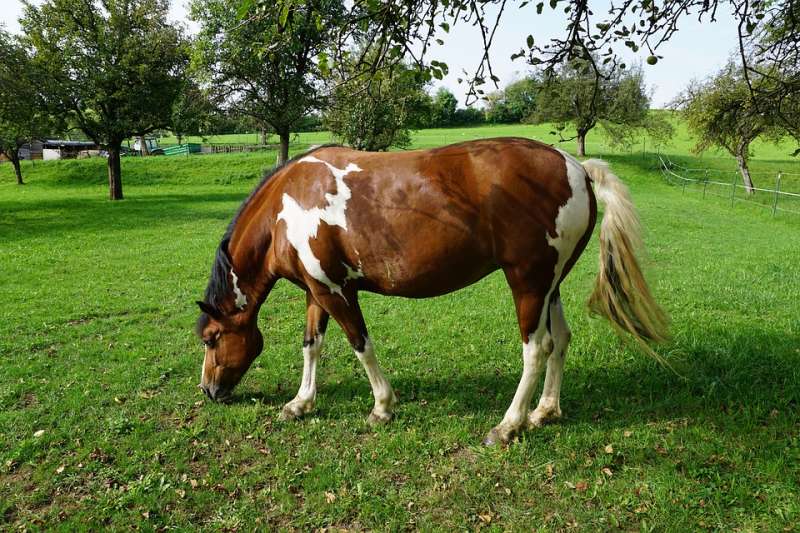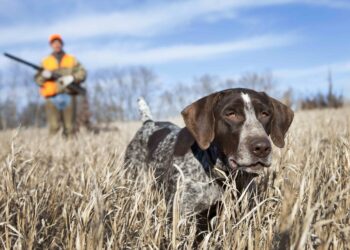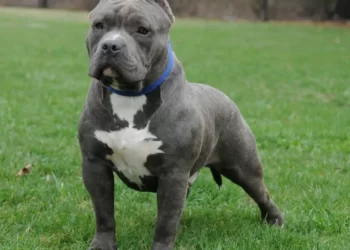It is difficult to generalize about the weight of a horse. Between a very small Mini Shetland, a very slender Arabian thoroughbred, and a powerful cold-blooded Ardennes-type horse, for example, the differences are great!
So why weigh your horse? How much does a foal weigh? What are the average weights of the main horse breeds? What is the impact of weight on food intake? And which are the heaviest and lightest horses in the world? We answer all of these questions in this article.
You May Like: 500 Racehorse and Horse Names
Weight of an adult horse
General information on horse weight
Sport horses are generally well-muscled, ponies that are not trained can easily pasture fattening. Mares sometimes lose a lot of weight during lactation.
Racehorses are rather very thin, show jumping horses well-muscled but lean, and dressage and western riding horses strong and muscular with a slightly higher fat content.
As for young horses, as well as those that are not trained they are lighter and have a lower percentage of muscles than sport horses.
Why weigh my horse?
Knowing your horse’s weight is helpful in many situations. First of all, it is thanks to its weight that you will calculate how much food you will give it. It is also important to know its weight if you need to administer medication, such as deworming, for example, so as not to poison it or, in another register, if you want to buy a new trailer!
Not a single horse format within the same breed
Of course, within a single breed of horse, there are different types, and there is no single standard format. Thus a horse can deviate, and sometimes considerably, from the average weight of its breed. In addition, in general, mares are lighter than stallions.
Apart from the breed, type, and size, another criterion must be taken into account when determining his weight: his training condition, which plays an important role in weight fluctuations.
You May Like: Horse boots: All You Need To Know
How much does a foal weigh?
A healthy foal will weigh 10% of its dam’s weight, regardless of breed. Foals that are born exceptionally large or very small are excluded from this figure, but generally speaking, this is a good average to keep in mind when estimating a foal’s birth weight.
And it does not change anything if the father is smaller or larger than the mother: the weight of the foal will always be obtained according to the weight of the mother alone.
Thus a Quarter Horse foal will weigh on average 65 kg at birth if the mare that gives birth weighs 650 kg. Also, note that a mare that foals for the first time often gives birth to smaller foals.
On the other hand, foals that weigh significantly less than 10% of the mare’s weight at birth are probably premature or have a health concern; call the vet immediately.
Average horse weight by breeds
Shetland ponies
Average weight: between 150 and 180 KG
The larger the pony, the more its weight fluctuates around the average, depending on the different types.
Riding ponies
Average weight: from 350 to 430 KG
These ponies can be of very different types as there are a few mixtures of breeds resulting in large variations in weight.
You May Like: Mare In Heat: Duration, Frequency & Signs
Icelandic horse
Average weight: from 300 to 450 KG
Icelanders are a fairly homogeneous race. They differ only slightly from each other in terms of weight.
Fjord horse
Average weight: 400 to 500 KG
There may be overweight horses in this breed, be careful!
Pure Arab blood
Average weight: from 350 to 450 KG
Arabian Thoroughbreds have very thin legs. Avoid being overweight.
Haflinger horse
Average weight: from 380 to 450 KG
Depending on the type (heavy or light), its weight and physique may vary. A round shape is acceptable but beware of being overweight.
The Tinker or Cob Gipsy horse
Average weight: from 550 to 600 KG
There are, however, big differences in weight among the Tinkers. Some horses are massive and heavy while others are sporty and light.
Andalusian or Purebred Spanish
Average weight: from 350 to 550 KG
He may be overweight. Mares are much thinner than males.
The Quarter Horse
Average weight: 420 to 560 KG
Quarter Horses are very different depending on the type and purpose of breeding: for example, there are both light racing horses and more rustic working horses.
Cold-blooded races
Average weight: 630 to 830 KG
Cold-blooded breeds are very different in appearance and size. It also influences their weight.
The warm-blooded horse
Average weight: from 500 to 600 KG
The differences between races, but also within the same race, are very large.
Frisian
Average weight: from 600 to 800 KG
There are significant weight differences within the various types of these horses: the Baroque type Friesian is heavier than the lighter sport type Friesian.
The horse weight for the calculation of food rations
Knowing your horse’s weight, as well as its physical condition, is essential information in determining its food intake quantitatively.
His weight is used as a basis for calculating his food ration
Thanks to its weight, you will be able to calculate how much feed to give it. Use the following rule: 1.5 kilograms of forage (minimum) per 100 kilograms of body weight. The same goes for any concentrated feed (including complementary feed) that you provide in addition to hay or grazed grass: your horse’s body weight is the basis for the recommended daily ration. Be sure to follow the manufacturer’s instructions on the packaging.
Also Read: 6 Most Common Horse Diseases
A horse whose weight deviates from its ideal weight
And in the event that your horse’s weight deviates from its ideal weight, you can use its breed’s average weight to calculate its daily food intake.
My horse is too thin
Let’s take an example: according to your calculations, your Quarter Horse weighs 450 kg, and is at least 50 kg underweight. To calculate his daily hay ration, you will then take as basic weight 550 kg, that is to say, the average weight of his breed.
Referring to the calculation rule stated above (1.5 kg of roughage per 100 kg of weight), your horse will then need at least 8 kg of hay (or another type of roughage adequate) every day. However, take into account the condition of your horse and its type to adjust the calculation basis as accurately as possible.
My horse is overweight
If your horse is too fat, do the same: use the breed’s average ideal weight as a basis for calculating his daily food intake.
Another example: according to your calculations, your Arabian thoroughbred weighs 550 kg, and is at least 50 kg overweight. For the calculation of its food ration, you will use the average weight of its breed, that is to say, 450 kg, as a basis of calculation.
He should, therefore, receive about 7 kg of forage per day (450 x 1.5 = 6.75). And if your horse is overweight, don’t cut it off, but keep going! Continue to feed him a diet adapted to his needs, which, combined with proper training, will gradually help to shed his extra pounds.
Gradual changes!
However, don’t be too extreme in implementing dietary changes. Keep in mind that a change to a new diet should always be done slowly and gradually.
Weight records and other curiosities
The heaviest horse in the world

The heaviest horse breed in the world is that of Belgian Brabant. Horses of this breed weigh up to 1400 kilograms: “Brooklyn Supreme”, nicknamed “Brookie”, who is one of the holders of the title of the heaviest horse in the world, was 1.98 m tall and weighed 1452 kilograms. He was born in Minneapolis in Minnesota and died in 1928 in the United States.
Another Shire horse born in 1846, which had been castrated at the age of one and a half, was measured 2.19 meters at the withers in 1850 and considered the tallest horse in the world. Her weight was estimated at no less than 1,520 kilograms, or about 70 kilograms more than Brooklyn “Brookie” Supreme!
For comparison, the average weight of cold-blooded horses is 600-700 kilograms, while that of warm-blooded horses is 500-600 kilograms.
You May Like: Lifespan of a Horse: Age, Food, and Health
The lightest horse in the world
Thumbelina, on the other hand, which has carried the title of “the smallest horse in the world” since 2006, is also considered the lightest horse in the world with a weight of only 26 kg, the weight of a shepherd dog. Belgian! But she has since been dethroned by Einstein, a Falabellas-born colt living in the United States who weighed only 2.7 kg and a height of 35 centimeters at birth.
Power-to-size ratio
The Shetland pony is often considered to be the breed with the most power for its size. Although he is not very tall, he can carry up to twice his weight! However, this is not advised, as it may cause serious damage to his health.
Horsehead weight
The head of a horse is on average 10% of its total weight.








